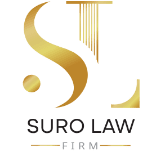Contact Suro Law
Get in Touch with Us
Contact Suro Law
Get in Touch with Us
While opinions are typically defended under the First Amendment, if an opinion is presented as a statement of fact, it may be considered actionable as defamation. Courts consider the context in which the statement was made to determine if it’s protected opinion or defamatory.
Defamation of Character Attorney Colorado
Let’s Talk


"*" indicates required fields
Copyright ©2024 David Suro The Suro Law Firm. All Rights Reserved.

"*" indicates required fields